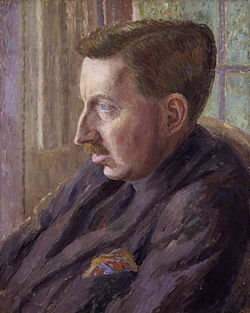E.M. Forster Quote
…The Emersons who were at Florence, do you mean? No, I don’t suppose it will prove to be them. It is probably a long cry from them to friends of Mr. Vyse’s. Oh, Mrs. Honeychurch, the oddest people! The queerest people! For our part we liked them, didn’t we? He appealed to Lucy. There was a great scene over some violets. They picked violets and filled all the vases in the room of these very Miss Alans who have failed to come to Cissie Villa. Poor little ladies! So shocked and so pleased. It used to be one of Miss Catharine’s great stories. ‘My dear sister loves flowers,’ it began. They found the whole room a mass of blue — vases and jugs — and the story ends with ‘So ungentlemanly and yet so beautiful.’ It is all very difficult. Yes, I always connect those Florentine Emersons with violets.…
…The Emersons who were at Florence, do you mean? No, I don’t suppose it will prove to be them. It is probably a long cry from them to friends of Mr. Vyse’s. Oh, Mrs. Honeychurch, the oddest people! The queerest people! For our part we liked them, didn’t we? He appealed to Lucy. There was a great scene over some violets. They picked violets and filled all the vases in the room of these very Miss Alans who have failed to come to Cissie Villa. Poor little ladies! So shocked and so pleased. It used to be one of Miss Catharine’s great stories. ‘My dear sister loves flowers,’ it began. They found the whole room a mass of blue — vases and jugs — and the story ends with ‘So ungentlemanly and yet so beautiful.’ It is all very difficult. Yes, I always connect those Florentine Emersons with violets.…
Related Quotes
About E.M. Forster
Considered one of the most successful of the Edwardian era English novelists, he was nominated for the Nobel Prize in Literature in 22 separate years. He declined a knighthood in 1949, though he received the Order of Merit upon his 90th birthday. Forster was made a Member of the Order of the Companions of Honour in 1953, and in 1961 he was one of the first five authors named as a Companion of Literature by the Royal Society of Literature.
After attending Tonbridge School, Forster studied history and classics at King's College, Cambridge, where he met fellow future writers such as Lytton Strachey and Leonard Woolf. He then travelled throughout Europe before publishing his first novel, Where Angels Fear to Tread, in 1905. The last of his novels to be published, Maurice, is a tale of homosexual love in early 20th-century England. While completed in 1914, the novel was not published until 1971, the year after his death.
Many of his novels were posthumously adapted for cinema, including Merchant Ivory Productions of A Room with a View (1985), Maurice (1987) and Howards End (1992), critically acclaimed period dramas which featured lavish sets and esteemed British actors, including Helena Bonham Carter, Daniel Day-Lewis, Hugh Grant, Anthony Hopkins and Emma Thompson. Director David Lean filmed another well-received adaptation, A Passage to India, in 1984.
